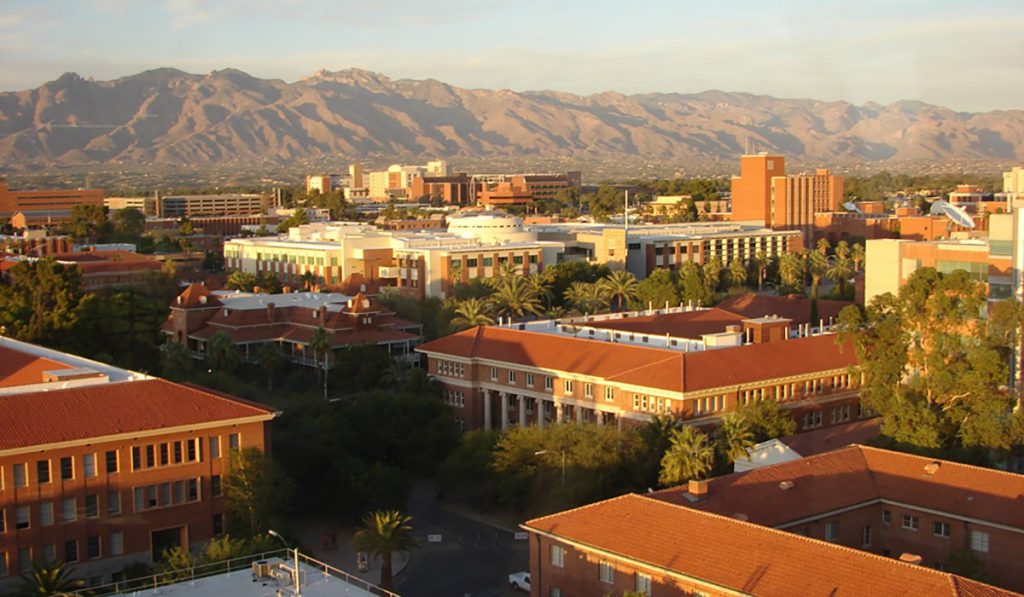
Published April 17, 2019
Amid the weekly cavalcade of campus horrors, it’s easy to miss a story that will mark a major turning point in the campus free-speech crisis, whether for good or ill. The growing confrontation at the University of Arizona over students who disrupted a Career Day presentation by Border Patrol agents is not your run-of-the-mill campus outrage. Instead it’s that rare case where student disruptors are facing real consequences for their actions. This is in significant part because of a new Arizona law strengthening discipline for such disruptions. If the university holds fast and the disruptors pay a price for silencing others, the move will carry national implications. Yet if the growing rebellion by anti-free-speech students and faculty at UA gets its way, the university will back down, the border patrol will be permanently barred from campus, and the university president could lose his job. That would be a disaster for free speech, and would mark a new and dangerous turn in America’s campus crisis.
Before taking the measure of the stakes in this battle, we’ve got to review the precipitating incident.
On March 19, a UA student named Denisse Moreno Melchor noticed a pair of U.S. Customs and Border Protection agents at the school. “I was like, ‘Get out,’ and started chanting and disrupting that space until they left,” she told the school paper the next day. The March 19 event that Melchor had — in her own words — disrupted, was a Career Day presentation being given by two border-patrol agents to the school’s Criminal Justice Association. You can see from videos originally taken by Melchor and reposted here that a she is hurling insults at the officers through a door, continuously calling them “murderers,” the “murder patrol,” and an “extension of the KKK.” As the officers are distracted by the chanting, some of the students in attendance move toward the door to help secure the scene.
At that point, a woman later identified as Luisa Pinto, a major in criminal-justice studies and president of the Criminal Justice Association, invites Melchor to sit inside [1:35]. Melchor replies, “Great, I can sit in, the entire time I’ll just be saying that they’re murderers, the entire f***ing time.” In other words, Melchor promises to continue disrupting, even if she’s allowed to sit inside.
At some point Melchor was joined by other students, and apparently by a UA employee as well. The latter part of the video records several protesters as they follow the agents to their cars while chanting “murder patrol.” At one point the students shout: “We won’t stop until you get off our campus.” So it’s evident from the words of the protesters themselves that right from the classroom disruption through the pursuit of the officers through the hallways, the intention of the chanting was to cut short any dialogue and drive the officers from campus.
An early assessment of this incident characterized it as a free speech close call. But while appropriate discipline for these offenders is up for debate, I don’t think there’s any doubt that this was a punishable disruption. The chanting was continuous, and was plainly intended to interfere with normal verbal exchange. This is not a case of a few spontaneous boos thrown at a speaker who has said something the audience disagrees with. Melchor wasn’t even listening to the presentation. She was just chanting “murder patrol,” as were the students who later joined her.
We also now have comments from Luisa Pinto, president of the Criminal Justice Association, who clearly believes that Melchor interfered with the agents’ presentation. According to Pinto: “She [Melchor] has every right to scream and yell all she wants outside the building, but the moment she’s inside a building and interfering with our education…our rights were violated.” Pinto also says that after the incident she contacted club members and was told that, given the disruption, they had not been able to learn anything from the presentation. In other words, this was a shout-down.
Certainly it’s important to attend to any evidence that might emerge at future hearings with an open mind. As of now, however, it seems clear that this was a punishable disruption.
The story up to this point is all-too-familiar. Yet events now take a new turn. Instead of rolling over, UA campus police filed criminal misdemeanor charges of “interference with the peaceful conduct of an educational institution” against Melchor and two other students, while Melchor was also charged with “threats and intimidation.” UA President Robert Robbins then backed up the campus police. “Student protest is protected by our support for free speech,” said Robbins, “but disruption is not.” Some claim the university’s concern with the incident only followed public outrage at the viral video of the disruption. The university denies this, but what does it matter? If it took legitimate public outrage to push administrators to act, that’s fine. What’s important is that discipline is warranted.
There’s another factor here as well. About a year ago, Arizona passed a campus free speech law that includes robust protections against shout-downs. That law is based on a nationally influential model published by Arizona’s Goldwater Institute. (Along with Jim Manley and Jonathan Butcher, I am a co-author of that model.) Many states have passed more limited laws abolishing restrictive campus-speech codes and so-called free-speech zones. But in addition to abolishing codes, zones, barring speaker disinvitations, and other matters, Goldwater-based laws include provisions for the discipline of shout-downs. Goldwater-based laws also establish an oversight system to ensure that administrators actually enforce the law’s provisions. President Robbins surely had the new state law in mind when he refused to withdraw the charges filed by campus police.
That said, it is by no means the case that Arizona’s new campus free-speech law requires the filing of criminal misdemeanor charges in response to a shout-down. On the contrary, the law actually focuses on the need for administrative hearings within the university, hearings at which accused disruptors are granted robust due-process rights. And the main punishments contemplated by the law are levied by the university itself — more like suspension from school than jail time. While misdemeanor charges certainly aren’t forbidden by the new law and are within the range of appropriate punishment in this case, I must admit to a slight preference for handling this case within the university, with perhaps 30-day suspensions in play for the offenders.
Still, I doubt the judge will give the students the maximum six-month sentence. They’re more likely to draw a slap on the wrist instead. And as we’ll see, the complete lack of remorse on the part of Melchor should also be taken into account. Fortunately, the university has also initiated an administrative investigation of this incident. That means the accused might ultimately be charged with violations of the student code of conduct in addition to, or even in place of, charges in court. The important point is that the disruptors must face significant consequences for their actions, whether that comes through the courts or via internal university procedures. In either case, the new campus free-speech law is a big part of why real consequences are still in play in this case.
Don’t think for a minute that the matter rests here, however. Administrators regularly cave to shout-downs for a reason. They’re afraid that what’s happening now at UA will happen to them. Students have come out in force to protest discipline for the disruptors. They’ve also been joined by hundreds of faculty members, largely from UA’s highly politicized minority studies programs. Student and faculty demonstrators poured into a recent meeting of the University of Arizona’s Board of Regents, the body responsible for overseeing the administrative handling of the new campus free-speech law.
The protesters claimed that the accused disruptors are being silenced, yet it’s actually quite the opposite. It’s the disruptors who silenced the border patrol and played havoc with their fellow students’ right to listen and learn. And if you attend carefully to the protesting faculty’s letter, the implicit message seems to be “Ignore the disruption, whether it happened or not.”
The student and faculty defenders of the accused disruptors style themselves “The Coalition for the Arizona 3.” The group has three demands: 1) drop any charges against the accused disruptors, whether criminal or within the university; 2) agents of ICE and the Border Patrol must be permanently banned from campus; and 3) if the first two demands are not met, President Robbins must resign.
If you think this last demand is far-fetched, recall the 2015 conflict at the University of Missouri. That debacle helped kick off the latest phase of the campus free-speech crisis. No more than a few dozen protesters blocked President Tim Wolfe’s car during a homecoming parade, made some highly debatable accusations against the campus atmosphere, and managed to force Wolfe’s resignation. This sent Mizzou into a tail-spin from which it has yet to recover. The forces arrayed against President Robbins at the University of Arizona are already far more formidable than was the pressure on President Wolfe at Mizzou in 2015.
And what of the other demands? Drop the misdemeanor charges and halt the investigation of student conduct code violations? Why? Is The Coalition for the Arizona 3 afraid of the facts in this case? The coalition does not marshal evidence to show that this was no disruption, yet they claim that the speech of the accused is being suppressed. That’s not what the video or the available testimony show. Why not let the rest of the facts come out in hearings at court or in school?
As for the demand that ICE and the Border Patrol be barred from campus, the Coalition for the Arizona 3 gives itself away here. This demand is entirely antithetical to freedom of speech and the rule of law. For one thing, the new Arizona campus free-speech law bars disinvitations by explicitly declaring the university, “open to any speaker whom a student, student group, or faculty member has invited.” Yet hundreds of students and faculty at UA want to permanently achieve precisely what the disruptors were aiming for on March 19. They want to kick the Border Patrol off campus forever, whether other students wish to invite them or not. That would be a gross violation of free speech, and of the new state law. More broadly, barring the Border Patrol would be an insult to the rule of law itself. Law enforcement cannot and must not be banned from the campus of a public university.
Melchor reportedly delivered the coalition’s demands when she spoke at the recent Board of Regents meeting. She insisted that the charges against her be dropped, that the agents she shouted-down be barred from campus forever, and that President Robbins must resign should he refuses to obey. That doesn’t sound like remorse to me.
In a recent interview, Melchor also said she doesn’t believe that Border Patrol agents should be allowed to present their perspective on campus. Clearly, this is a person who does not believe in free speech. It seems reasonable to conclude that this viewpoint guided her actions on March 19.
The Mizzou fiasco of 2015 sparked a major escalation of the campus free-speech crisis. We are now at a moment that could easily be as consequential — although perhaps in the direction of improvement. President Robbins must not be fired or made to resign because he refuses to withdraw the charges. And whether by trial for a misdemeanor, or by administrative discipline for violation of the student-conduct code, or both, the accused disruptors must face significant consequences should hearings bear out what currently available evidence indicates.
I can’t think of a single case since 2015 in which a shout-down has been disciplined in a way likely to deter future incidents. In the few cases where discipline has been applied, other administrative actions have nullified the deterrent effect. But if the University of Arizona follows through and the disruptors face real consequences, we might someday reach the point where shout-downs will stop and discipline will seldom, if ever, be required. The point is not to punish but to prevent speech-suppression from happening in the first place. A few well-handled instances of discipline in the near term could be enough to establish deterrence and render punishments at UA unnecessary down the road. That would send out a signal nationally.
On the other hand, should the Coalition for the Arizona 3 carry the day, it would effectively green-light further shout-downs. And it would show for now that even in the face of a law to the contrary, campus administrators have been completely cowed by the anti-free speech left. I say “for now,” because Arizona’s new law provides for recourse in the event of such a drastic capitulation. The new law instructs the Arizona Board of Regents to create a committee to write an annual oversight report on the administrative handling of free speech. That report must comment on discipline for shout-downs, in particular. If President Robbins surrenders, and the disruptors face no consequences either in court or within the university, then it is the obligation of the oversight report to condemn this. It is also the obligation of the legislature to respond by cutting back funding for the university.
Then there is President Trump’s new executive order on campus free speech, which puts federal research funding in play when campuses grow hostile to free inquiry. A campus that capitulates to classroom disruptors and bars invited speakers is not open to free inquiry. What faculty researcher would dare to risk the ire of the militant campus left at UA after such a capitulation? This goes for any researcher, but note that UA has traditionally been home to a good deal of federal research assistance on the topics of immigration and border security. Capitulation to the speech-suppressing demands of the Coalition for the Arizona 3 would certainly call the atmosphere of free inquiry required for such research into question. A research center couldn’t even invite immigration agents onto campus, whether for consultation or presentation. True, we don’t yet know precisely how President Trump’s executive order will operate. Still, UA might want to contemplate the new EO as it works through this conflict. The price of surrender to campus shout-downs may soon be about to rise.
So we are entering new territory. Arizona’s strong new campus free-speech law, together with the president’s executive order on campus free speech, likely already have much to do with the backbone being shown by UA in this highly atypical case. For that very reason, the anti-speech left at UA is now enraged and fully mobilized. This is a major national show-down and an important potential turning point in the campus free-speech crisis. We don’t yet know how it will end.
Stanley Kurtz is a senior fellow at the Ethics and Public Policy Center.








